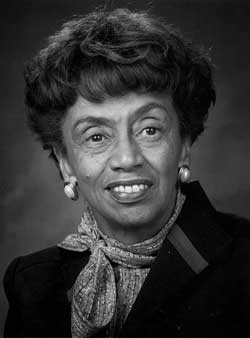Jewel Cobb (Jewel Plummer Cobb)

Jewel Plummer was born in Chicago on January 17, 1924 as the only child of Frank V. Plummer, and Carriebel (Cole) Plummer. She was the great-granddaughter of a freed slave. Her grandfather was a pharmacist, her father Frank was a physician. Her mother Carriebel was a physical education teacher. Jewel Cobb enjoyed an upper-middle-class background and had access to her father’s library, which contained scientific journals. It is recorded that the concerns and accomplishments of Black Americans were often discussed in her household. She initially intended to become a physical education teacher. However, during her sophomore year of high school, she became interested in biology. Both Cobb’s schoolwork and her interest in science were supported by her parents. Cobb matriculated at the University of Michigan in 1942, but unsatisfied with segregated housing for African-American students at Michigan, she transferred to Talladega College in Alabama, where she graduated with a B.A. in biology in 1945. She became a member of Alpha Kappa Alpha sorority. Jewel Cobb initially was denied a fellowship for graduate study in biology at New York University because of her race. However, following a personal interview, she was granted the fellowship. She received her M.S. degree from NYU in 1947 and her Ph.D. degree in cell physiology in 1950. Her dissertation “Mechanisms of Pigment Formation” examined the way melanin pigment granules could be formed in vitro using the enzyme tyrosinase. In 1949 she was appointed an independent investigator at Woods Hole Marine Biological Laboratory.
Following the receipt of her Ph.D. from NYU, Jewel Cobb held post-doctoral positions at the Harlem Hospital Cancer Research Foundation, Columbia University College of Physicians and Surgeons, and the National Cancer Institute. Cobb’s research included work on the relationship between melanin and skin damage, and on the effects of hormones, ultraviolet light, and chemotherapy agents on cell division. Cobb discovered that methotrexate was effective in the treatment of certain skin cancers, lung cancers, and childhood leukemia. This drug continues to be used in chemotherapy to treat a wide range of cancers, and in lower doses to treat a number of autoimmune diseases. In addition, Jewel Cobb was the first to publish data on the ability of actinomycin D to cause a reduction of nucleoli in the nucleus of human normal and malignant cells. Jewel Cobb directed the tissue culture laboratory at the University of Illinois from 1952 to 1954, and worked as a faculty member at NYU from 1956 to 1960, and at Sarah Lawrence College from 1960 to 1969. Cobb collaborated with numerous other researchers, including noted oncologist Jane C. Wright, Grace Antikajian, and Dorothy Walker Jones. Her most influential mentors were her bacteriology professor James R. Hayden and biochemistry professor M.J. Kopac. In recognition of her research achievements, Cobb was elected to the Institute of Medicine of the National Academy of Sciences in 1974. She was a member of the National Science Board from 1974 to 1980. Jewel Cobb most recently resided in Maplewood, New Jersey. She died there on January 1, 2017 at the age of 92.
Born
- January, 17, 1924
- USA
- Chicago, Illinois
Died
- January, 01, 2017
- USA
- Maplewood, New Jersey



